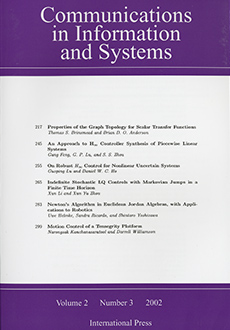Abstract
Over the last three decades, the certainty equivalence principle has been the fundamental paradigm in the design of adaptive control laws. It is well known, however, that for general control criterions the performance achieved through its use is strictly suboptimal. In order to overcome this difficulty, two different approaches have been proposed: i) the use of cost-biased parameter estimators; and ii) the injection of probing signals into the system so as to enforce consistency in the parameter estimate. This paper presents an overview of the cost-biased approach. New insight is achieved in this paper by the formalization of a general cost-biased principle named “Bet On the Best”-BOB. BOB may work in situations in which more standard implementations of the cost-biasing idea may fail to achieve optimality.
Citation
S. Bittanti. M.C. Campi. "Adaptive Control of Linear Time Invariant Systems: The “Bet on the Best” Principle." Commun. Inf. Syst. 6 (4) 299 - 320, 2006.
Information





